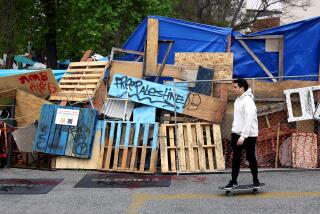Cancer Calls Answered via Toll-Free Hot Line
- Share via
“Is the nuclear disaster at Chernobyl likely to affect cancer rates in Southern California?”
“I have throat cancer. Why did my doctor tell me to quit drinking alcohol?”
Those are the sort of questions volunteers answered during a recent shift on the switchboard of the Cancer Information Service of California (CISC).
CISC is a toll-free hot line providing detailed, up-to-date facts about all forms of the disease to the public and health professionals.
Sixty trained volunteers at USC’s Comprehensive Cancer Center and the Jonsson Comprehensive Cancer Center at UCLA answer calls, in English or Spanish, from 9 a.m. to 4:30 p.m., Monday through Friday. The statewide number is 1-800-4-CANCER or 1 (800) 422-6237. After hours, callers are referred by a taped message to the National Cancer Institute’s Information Service.
“People have a lot of concerns about cancer, both how to prevent it and how to cope with it when they or someone in their family has it,” explained Susan Karlins, associate director of the service, which is sponsored by the National Cancer Institute in Bethesda, Md.
“People feel comfortable talking to us because we are not directly involved with their situation. But we are well trained, and we do have scientific sources of information we refer to and help interpret,” Karlins said.
Volunteers in the program receive 36 hours of classroom instruction and undergo a two-month internship on the telephones. Rather than relying on memory, however, the volunteers respond to callers’ questions by reading from scientific texts and patient-oriented pamphlets, Karlins said. In addition, the service has a selection of more than 300 publications it can send in response to specific inquiries.
Volunteers also make referrals to board-certified oncology specialists and recommend social services such as home care and support groups. “We often help callers formulate what types of specific questions to ask their own doctors,” Karlins said.
Many of the 75 to 175 calls the hot line receives each day concern preventing cancer. In response to those calls, volunteers cite National Cancer Institute recommendations, Karlins said.
For instance, the institute suggests low-fat, high-fiber diets as a possible defense against colon, breast and prostate cancer. It also advises that excessive exposure to sunlight is directly related to skin cancer. “And the institute says that 30% of all cancer deaths are related to tobacco,” Karlins said, adding that when people request information on how to quit smoking, volunteers provide literature and refer them to smoking cessation groups.
In response to questions concerning cancer cure “quackery,” Karlins said: “We don’t provide information that this is what you should do. We provide information that this has been tested and there’s no information that it works.”
Karlins added that hot-line volunteers understand callers’ desire to find a “magic cure” for the disease they or a friend or relative has developed. Fortunately, volunteers are able to tell some callers that there is a ready cure, she said. “Sometimes people have cancers that are very curable, and they don’t know that.”
More to Read
Sign up for Essential California
The most important California stories and recommendations in your inbox every morning.
You may occasionally receive promotional content from the Los Angeles Times.













